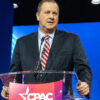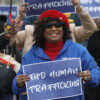What does America’s declining economic freedom mean for you? It means that America will create fewer jobs. And that means that Americans will be poorer, as well as less free.
A statement last week by Graham Mackay, the head of SAB Miller, one of the world’s largest brewers (they make, among many other beers, Miller Lite), explains how and why this will happen.
In 1999, SAB Miller moved its headquarters to London, attracted, Mackay said, by “the liberal and predictable tax regime.” But since the mid-2000s, the UK has been losing economic freedom. In fact, in 2010, the UK fell out of the top ten for the first time, just as the U.S. dropped into the ranks of the ‘mostly free’ in the Index of Economic Freedom. The UK’s ranking has now declined for four consecutive years, and the level of economic freedom in Britain is now as low as it has been since the Index began to measure it in 1995.
As a result, Mackay pointed out, the conditions that drew SAB Miller to Britain no longer exist:
Today the tax system is not predictable and there have been numerous increases, particularly when it comes to personal taxation. This means that as a global company we are no longer able to attract our best global talent to the UK. Why would someone move from Hong Kong where the marginal tax rate is 15 per cent and come to the UK where it is closer to 52 per cent. Taxation was a key part of our decision to locate a new global procurement business not in the UK but in Zug in Switzerland.
That single decision lost Britain 400 jobs. And SAB Miller is not the only company to flee the increasingly unfree economy of Britain. The damage goes far beyond the banking and financial sector: firms such as Vodafone, the cellular provider, have also departed.
And where have they gone? SAB Miller is worried about drawing talent to Britain (ranked eleventh in the Index) from Hong Kong (ranked first) and instead set up its new business in Switzerland (ranked sixth). Vodafone went in part to Ireland (ranked fifth). This is a competitive world, and businesses have choices. If the U.S. continues to fall behind in economic freedom, some businesses – as the example in Britain of SAB Miller shows – will make a rational decision to move elsewhere, and others will have less money to pay workers because they will be giving more to the taxman.
In his State of the Union address, the President stated that “And to encourage these and other businesses to stay within our borders, it’s time to finally slash the tax breaks for companies that ship our jobs overseas and give those tax breaks to companies that create jobs in the United States of America.”
But they’re not “our jobs” by eternal right. They are jobs created by private enterprise, within the context of the burdens imposed by the federal government. And as those burdens get heavier, the number of jobs on offer in this country shrinks. If the President is serious about job creation, he will address the real threat to it: the policies of his administration, and of past ones, that reduced the willingness of companies to invest and their ability to grow by restricting our economic freedom.


























